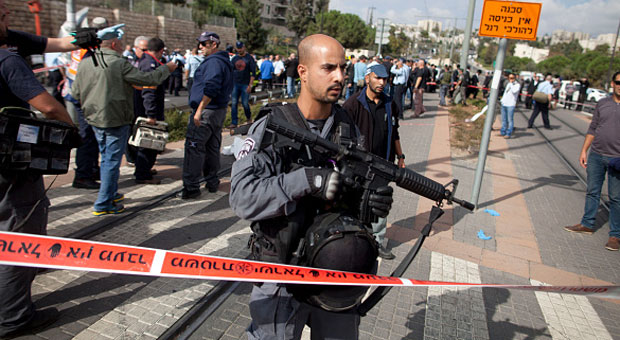Hit and run attack: what is happening in jerusalem?
- Select a language for the TTS:
- UK English Female
- UK English Male
- US English Female
- US English Male
- Australian Female
- Australian Male
- Language selected: (auto detect) - EN

Play all audios:

An Israeli policeman has been killed in a "hit-and-run terrorist attack" in Jerusalem, sparking further fears that the violence could lead to a third intifada. Hamas claimed
responsibility for the attack, with an official from the Islamist militant group praising it as a "glorious operation" and calling for more attacks to take place. WHAT HAPPENED
YESTERDAY? SUBSCRIBE TO THE WEEK Escape your echo chamber. Get the facts behind the news, plus analysis from multiple perspectives. SUBSCRIBE & SAVE SIGN UP FOR THE WEEK'S FREE
NEWSLETTERS From our morning news briefing to a weekly Good News Newsletter, get the best of The Week delivered directly to your inbox. From our morning news briefing to a weekly Good News
Newsletter, get the best of The Week delivered directly to your inbox. The man, identified as Ibrahim al-Akri drove his vehicle into a crowd of pedestrians in East Jerusalem, killing a
police officer and injuring 13 civilians, three of them critically. According to eye-witnesses, he then exited his car and began attacking people with an iron rod. "A border policeman,
taking the initiative, drew his weapon and eliminated the terrorist," Nir Barkat, the mayor of Jerusalem, told journalists at the scene of the attack, according to The Guardian. The
attack came just hours after Palestinians clashed with Israeli police in protests at the holy site of the al-Haram al-Sharif compound, known to Jewish worshippers as the Temple Mount.
Protesters were responding to a prayer vigil that had been planned by Israeli activists who are banned from playing at the site. WHAT HAS BEEN HAPPENING? Yesterday’s killing is the second
fatal car attack in as many weeks. Last week, a woman and a baby died after a Palestinian man drove into them in the street. The violence in Jerusalem has been escalating, with almost daily
clashes between Palestinians and Israeli security officials, the BBC reports. WHY DID IT HAPPEN IN JERUSALEM THIS TIME? The location is culturally and historically significant as Jerusalem
has long been at the centre of the conflict with both sides claiming it as their holy capital. Palestinians are asking for East Jerusalem to be the centre of their future state while Israel
says the whole of the city is its "eternal capital". Last week, Rabbi Yehuda Glick was shot and seriously injured for advocating for Jewish prayer rights at the Temple Mount. In
response to the attack, the holy site was closed for several days, a move the Palestinian leader Mahmoud Abbas described as "an act of war". WHAT HAS THE REACTION BEEN? Each side
accuses the other of instigating the continuing violence in the city. Israeli Prime Minister Benjamin Netanyahu blames Hamas for the violence while Palestinian President Mahmoud Abbas has
said the Israeli security forces in the country need to shoulder the blame. "This is a hard day for Jerusalem," Jerusalem’s mayor said yesterday. The mayor urged the government to
act with "a firm hand to win the war" against terror and rioting. "The only answer is to get the city back to normal and continue our daily lives because that sends a message
to these terrorists: ‘We are here and we will not leave,’ " he said. Meanwhile, Jordan has recalled its ambassadors to Israel in protest at what it calls "unprecedented Israeli
escalation". It is also expected to lodge a formal complaint with the United Nations Security Council, according to Haaretz. WHAT NEXT? There are growing fears that the escalating
violence could lead to a third intifada, as the fate of Jerusalem, and particularly the compound, remains "one of the most contentious issues" between Israelis and Palestinians.
"There is still a lot of tension and a huge police presence here," Al Jazeera's Imtiaz Tyab reported from Jerusalem. Yesterday’s attack combined with provocations by Israeli
police, which include briefly entering the al-Aqsa mosque during yesterday’s protests, "will certainly not do anything to calm the situation," he said.